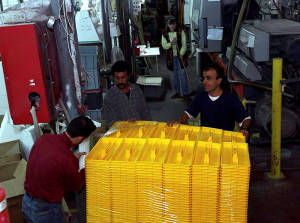The Arab media usually takes an extremely negative stance towards Israel, but regarding Israel’s treatment of its Palestinian workers, there is only praise.

Palestinian employees working at an Israeli factory at the Barkan Industrial Park in Samaria. (Photo: Flash90)
The Palestinian Authority (PA)-controlled media is notorious for its publishing of incitement and lies against Israel, but there is always an exception to every rule. An article recently published by the PA official daily Al-Hayat Al-Jadida lauds Israel and Israeli employers of Palestinians for their positive employment ethics towards their workers, Palestinian Media Watch (PMW) reports.
The article explains that Palestinian workers get their full rights when employed by Israelis directly; in fact, the only time that is not the case is when there is a Palestinian middleman.
“The only cases in which a Palestinian worker does not receive the salary his Israeli [employer] determined for him are those cases in which the middleman is Palestinian,” PMW quotes the paper as saying.
Higher Wages, Better Benefits
According to data presented by the Palestinian Bureau of Statistics (PBS), Palestinian employees in Israeli factories earn two-to-three times more than the average pay earned by the general Palestinian population, and they receive full social benefits as prescribed by Israeli law. The average daily wages for Palestinians employed by Israelis increased from 178.9 NIS in the third quarter of 2013 to 182.9 NIS in the fourth quarter of the year.
At the same time, the Al-Hayat Al-Jadida article condemned Palestinian employers for taking advantage of their workers, PMW points out. “Whenever Palestinian workers have the opportunity to work for Israeli employers, they are quick to quit their jobs with their Palestinian employers – for reasons having to do with salaries and other rights… The [Israeli] work conditions are very good, and include transportation, medical insurance and pensions. These things do not exist with Palestinian employers.”
The article compares the work conditions provided by Israeli and Palestinian employers.
“Muhammad Al-Hinnawi, a construction worker, says: ‘I receive a daily salary of 70 shekels, without pension, and I have no other choice.’ By contrast, Thaer Al-Louzi, who used to work for an Israeli concrete factory, notes: ‘I received a salary of 140 shekels a day. Now, after I was injured, I receive a salary through the insurance.'”
Job Security and Stability
This is not the first time Israel has been praised for its high standards and exemplary treatment of Palestinian employees.
The Al-Hura Arab language TV network ran a segment earlier this year on unemployment in the Palestinian Authority. Part of the presentation focused on Palestinians employed by Israeli-owned factories in Judea and Samaria that are constantly under the threat of boycott, divestment and sanctions (BDS), especially by countries from the European Union.
A Palestinian employee at the Barkan industrial park in Samaria told the Al-Hura reporter: “Living is expensive and the financial state is very difficult. There are places of employment that do not pay you in the end. Here I work and get paid every month with no problems.”
The reporter added that the financial state in the Palestinian Authority is dire and that these people, by working in Israeli factories, help alleviate unemployment in the PA.
“According to our data there is a 23% unemployment rate in the PA and 33% live under the poverty line as defined by the PA,” said Dr. Muhamad Aashatiya, PA Chair Mahmoud Abbas’s senior adviser. “It’s not enough to tell people not to work in Israeli factories. You need to provide an alternative,” he added.
Side by Side with Israelis
Deputy Head of the Samaria Regional Council Yossi Dagan, who participated in the TV feature, explained:
“There are 10 large industrial centers in Judea and Samaria, in which some 15,000 Palestinians work side by side with Israeli employees. At Barkan alone 3,000 Palestinians are employed together with 3,000 Israeli employees. They work together, earning the same wages, enjoying the same social benefits, vacation days and pension as prescribed by Israeli law. They go on trips together. Coexistence between the two peoples happens here, and all are awarded with a good and respectable livelihood.”
Author: Aryeh Savir
Staff Writer, United With Israel
(With files from the Palestinian Media Watch)
